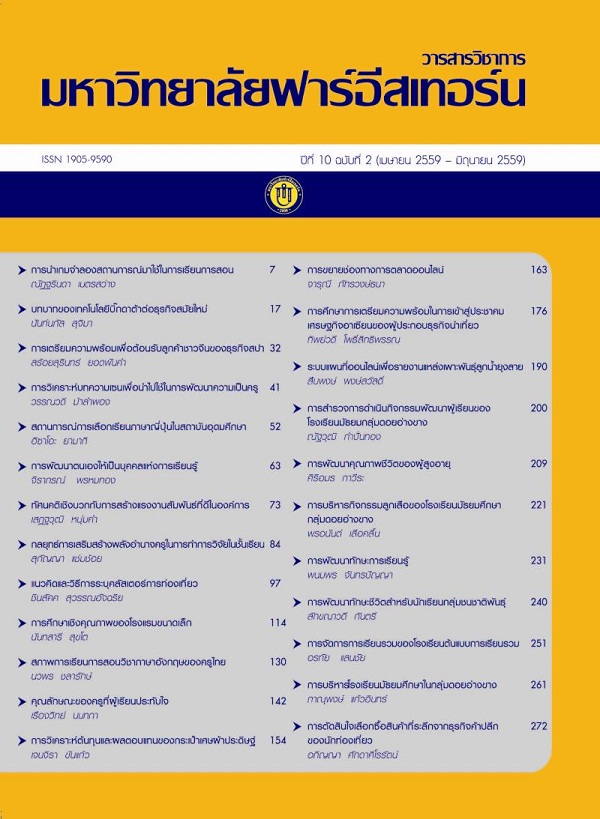การนำเกมจำลองสถานการณ์ (Beer Game) มาใช้ในการเรียนการสอน เรื่อง ปรากฏการณ์แส้ม้า (Bullwhip Effect) ในรายวิชาการจัดการโซ่อุปทานและโลจิสติกส์
Main Article Content
Abstract
ปัจจุบันการจัดการห่วงโซ่อุปทานได้เข้ามามีบทบาทมากขึ้นทั้งในภาคธุรกิจและการศึกษา โดยหลักสูตรที่ใช้มักเป็นการเรียนผ่านผู้สอนโดยใช้การบรรยายเป็นหลัก ซึ่งการเรียนผ่านผู้สอนนั้นข้อจำกัดในเรื่องของการเข้าถึงแนวคิด และทำความเข้าใจในเรื่องที่ซับซ้อนของห่วงโซ่อุปทาน บทความนี้กล่าวถึงการนำเอาเกมจำลองสถานการณ์ที่เรียกว่า Beer Game มาใช้เป็นสื่อในการเรียนรู้เรื่อง ปรากฏการแส้ม้า (Bullwhip Effect) ของห่วงโซ่อุปทาน ซึ่งเป็นเนื้อหาที่มีความซับซ้อนยากแก่การเข้าใจ
ผลจากการนำ Beer Game มาใช้เป็นสื่อในการเรียนการสอนของรายวิชาการจัดการโซ่อุปทานและโลจิสติกส์พบว่า ผู้เรียนสามารถสรุปองค์ความรู้ที่ได้จากการเรียนรู้ด้วยตนเองผ่านประสบการณ์การลงมือปฏิบัติและสามารถเชื่อมโยงองค์ความรู้ที่สังเคราะห์ได้เข้ากับหลักการทางทฤษฎีได้เป็นอย่างดี อย่างไรก็ตามกันการนำ Beer Game มาใช้กับการเรียนการสอนในชั้นเรียนยังมีข้อจำกัดสำคัญหลายประการ เช่น ข้อจำกัดในด้านจำนวน และความแม่นยำของผู้ควบคุมเกม และข้อจำกัดในด้านเวลาที่ใช้ในการเล่นเกมแต่ละครั้งเป็นต้น
Recently, Supply Chain Management is become more importance, both in industry and
academia. Most Supply Chain Management courses offered by universities and business schools
are text-based. However, text-based learning is limited to gathering concepts and understanding
complex topics of supply chain. This paper illustrates apply of simulation game called Beer Game
in learning Bullwhip Effect of supply chain, which is a complex topic and difficult to understand.
The result of Beer Game applied for the Supply Chain and Logistics Management class shows that
students can summarize the knowledge from their workshop experience and also link the knowledge
with the theory as well. However, the used of Beer Game in the class room also has many limits.
For example, limit in the number and the accuracy of the controller and time limited for game playing.
Article Details
1. Any views and comments in the Journal of Social Innovation and Lifelong Learning are the authors’ views. The editorial staff have not to agree with those views and it is not considered as the editorial’s responsibility.
2. The responsibility of content and draft check of each article belongs to each author. In case, there is any lawsuit about copyright infringement. It is considered as the authors’ sole responsibility.
3. The article copyright belonging to the authors and The Far Eastern University are copyrighted legally. Republication must be received direct permission from the authors and The Far Eastern University in written form.
References
เนาวะรัตน์ ถาวร. (2546). ผลของการใช้สถานการณ์จำลองที่มีต่อความมีน้ำใจของนักเรียนชั้นประถมศึกษาปีที่ 6 โรงเรียนกุหลาบวัฒนา เขตสัมพันธ์วงศ์ กรุงเทพมหานคร. การศึกษามหาบัณฑิต. สาขาจิตวิทยาการศึกษา มหาวิทยาลัยศรีนครินทรวิโรฒ.
ศิริชัย จงจินตรักษา. (2549). การพัฒนาแบบจำลองสถานการณ์ “เบียร์เกม” เพื่อวิเคราะห์ปัจจัยที่มีผลต่อปรากฏการณ์ “บูลวิพ”. วิทยาศาสตร์มหาบัณฑิต. สาขาวิชาการจัดการด้านโลจิสติกส์ (สหสาขาวิชา) จุฬาลงกรณ์มหาวิทยาลัย.
สถาพร โอภาสานนท์. (2554).VMI: Vendor Managed Inventory (2). Logistics and Supply Chain Management. 2554 (ฉบับที่ 34), 5-10.
สุขสม สิวอมรรัตน์. (2552). ผลของการใช้สถานการณ์จำลองที่มีต่อความสามารถในการทำงานกลุ่มของนักเรียนชั้นประถมศึกษาปีที่ 5 โรงเรียนวัดเลียบราษฎร์บำรุง เขตบางซื่อ กรุงเทพมหานคร. การศึกษามหาบัณฑิต. สาขาวิชาจิตวิทยาการศึกษา มหาวิทยาลัยศรีนครินทรวิโรฒ.
Gibbons. (1995). A concrete approach to mathematical modelling. New York : Wiley and son.
Hau L. Lee, V. Padmanabhan and Seungjin Whang. (1997). Bullwhip Effect in Supply Chain. สืบค้นเมื่อ 22 เมษายน 2559, จาก http://sloanreview.mit.edu/article/the-bullwhip-effect-in-supply-chains/.
Knolmayer, Gerhard. (2007). Teching Supply Chain Dynamics Beyond the Beer Game. Institute of Information Systems University of Bern.
Lehtonen, Juha-Matti. (2003). Enperimental learning through a simulation game in teaching of production management. International workshop on Experiment interactive learning in industrial management. 2003(22-24 May), 63-74.
Nyberg, Minna-Forssen. (1998). Development of the production using participative simulation game : Two case studies. Journal of Production Economics. 2003(Vol.56-57), 169-178 .

